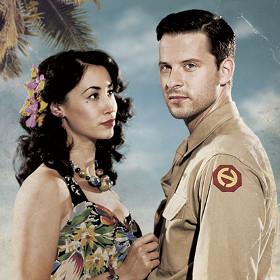Michael Coveney: From Hare to Eternity – playwright knocks musicals as Rice preps for premiere
This week’s big opener in the West End is Tim Rice’s screen-to-stage musical ”From Here to Eternity” – but it doesn’t look like David Hare will be attending

One of the few unsurprising things David Hare said at his National Theatre platform with Penelope Wilton last week, celebrating the 50th anniversary of the NT, was that he really doesn't like musicals (he doesn't, or didn't like Noel Coward, either, and he ended up being a great champion of the washed-up John Osborne, so we take all these utterances with a large pinch of salt).
He's not really all that far off disagreeing with his old Lancing College contemporary Tim Rice, who doesn't much like musical theatre either, but who has written some of the most successful musicals in modern times nonetheless: not just Joseph, Jesus and Evita with his old mucker Lloyd Webber, but also The Lion King and Aida with Elton John (of the latter show he famously remarked that the only thing that needed fixing with Verdi's opera was the music!).
Tim's latest project is From Here to Eternity, which some critics have been scrutinising over the weekend while others pop along to the Shaftesbury tonight and tomorrow, with reviews embargoed until Thursday after the "press night" on Wednesday. It's a comparatively light week in the London theatre, so there should be plenty of space available for pictures and verbiage; though the big difference today is that the tsunami of internet coverage is unaffected by lay-out restrictions and editorial priorities.
The interesting thing here is that the composer of the show, Stuart Brayson, a West End debutant, is a complete unknown who bombarded Rice with cassettes of his work – he's written musicals about northern miners (sounds a bit Alan Price, which is good), Lord Byron (I wonder if it's called, "Mad, Bad and Dangerous to Know"?), Oscar Wilde (could that be "Cucumber Sandwiches"?) and Wall Street (not the upcoming American Psycho at the Almeida).
And Rice says that he has composed 90 percent of the lyrics, claiming immodestly that he has done some fairly good work after drawing inspiration from some of Brayson's song titles, such as the opening "G Company Blues" and "Love Me Forever Today", aka "Burt Lancaster's first song".
The multiple Oscar-winning 1953 movie looms invariably large, though Brayson and Rice have gone right back to the 900-page novel by James Jones, acquiring the rights from the author's daughter and restoring much more of the gay bashing content; the story of two difficult love affairs, though, between the sergeant and his commanding officer's dissatisfied wife (the Deborah Kerr role), and between the disillusioned ex-boxer and champion bugler (the Montgomery Clift role) and a night-club hostess, are apparently retained, as well they should be; Daniel Taradash's screenplay – which also restored the waning fortunes of Frank Sinatra as a drunken, doomed private in the rifle corps – is one of the most brilliant and surprising in the movies of the period, climaxing in the bombing of Pearl Harbour.
Comparisons will invariably be made, not necessarily flattering, with South Pacific, and Rice and Brayson have already indicated that the soundscape for the show straddles the two eras of swing (that's the milieu of the older characters) and blues. You can see how the idea originated, as the movie has one or two potent blues numbers already.
Although the cast on paper looks good, there are no box-office star names (any more than there are for Andrew Lloyd Webber's new Stephen Ward musical), so it's the show itself that has to score with the critics and punters; but it's a great feeling to be approaching a big West End first night with no real idea of how things are going to turn out; or indeed how director Tamara Harvey has decided to stage – unless she's sacrilegiously cut it all together – the great sexually explosive scene of Burt Lancaster and Deborah Kerr embracing ecstatically in the pounding surf on the beach.
One thing we know for sure is that, though it's long (ten minutes shy of three hours), the musical doesn't quite stretch from here to eternity, though of course there's always a chance it might seem like that. Tim Rice knows better than most the dangers inherent in naming a show that invites a tag line: Which Witch ("Why, why"), Twang!! ("Crash, wallop") or even Chess ("Checkmate"). No harm, though, came from Les Miserables being instantly labelled "The Glums."
At his NT platform, David Hare did make two exceptions to his loathing of musicals: the first act of Guys and Dolls as directed by Richard Eyre, and as sung by Julie Covington as Sarah Brown; and the first act of Carousel as directed by Nicholas Hytner ("You don't want to hear the second act, you just don't, especially when they sing about going to heaven with a football anthem," he said), both at the National.
And then he reiterated his admiration for Julie Covington – he directed her in the first new play ever staged by the NT on the South Bank, Howard Brenton's Weapons of Happiness (1976) – by saying that her incredible voice on the original album of Evita was a thing of wonder and raw, natural, unmediated beauty, which it was. But Julie chickened out of doing the show on stage, no-one really knows why; she was an arch exponent of the songs of Clive James and Pete Atkin, and was nervous of "show business."
So the producers, and Tim Rice himself, had to settle for an unknown called Elaine Paige.












